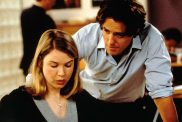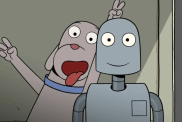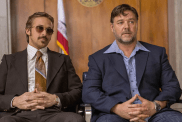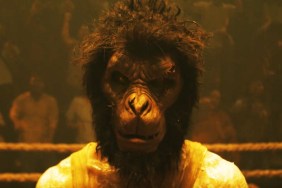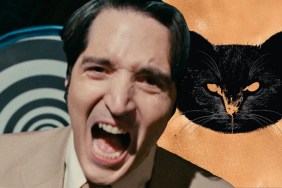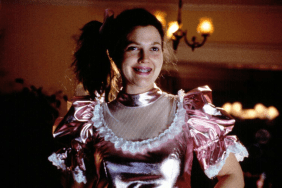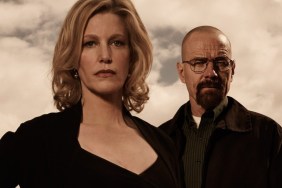The Mayan calendar ends in December of 2012 and there are widespread beliefs it will come with massive destruction and that a transformation will take place around the world to change civilization as we know it. Roland Emmerich gives his version of the apocalypse in Columbia Pictures’ disaster film 2012, hitting theaters on November 13.
The director, who is known for his big-budget CGI extravaganza sequences, blows up more historical landmarks in the film with Yellowstone National Park being one of them. ComingSoon.net went to Jackson Hole, WY, which is near the park, to interview stars John Cusack, Chiwetel Ejiofor and Amanda Peet.
Q: What are your personal thoughts of what will happen in 2012?
John Cusack: Do you know the book, “The Return of Quetzalcoatl”? That book, I think, is a little more in line with what I think will happen; a shift in consciousness. That seemed to be more of what I think will happen rather than an actual end of days.
Chiwetel Ejiofor: I’ll just spend it kind of quietly with family and friends and hope for the best. I don’t have a real opinion about 2012. I think it is like John said, a shift in consciousness. It feels like things are converging and that something has to change and maybe it will center around that time.
Amanda Peet: I am kind of a hypochondriac, and I worry about a lot of things, so I’m really going try to not worry about it too much.
Q: Is this the most physical movie you have ever done, and what was it like working in front of a green screen?
Cusack: Yeah, this was pretty action packed for sure. It wasn’t any different than a lot of films, in a way, because of the production design. Usually, you have the entire set built, and then in back of the set would be a green screen. There was a massive production design team working on the set. When we were on the mountain there would be a huge glacier field and there would be blue screens in the background so we were always acting with regular sets; it was the backgrounds that were being digitally enhanced… Yeah, a lot of running, jumping, and tumbling. You got to stay stretched out or you could pull a hamstring, for sure.

Ejiofor: I got off pretty lightly being in the government. Yeah, I had a couple of days of fun work, but that was it. I was slightly envious not to be able to work on the shaky floor. It looked pretty cool.
Q: John, what was the hardest thing for you to do in this movie?
Cusack: I thought it was pretty fun actually. It was a great group of people, the story was great, and the studio was great. Roland has done this so many times before. What would be a crushing technical process for other directors, he seems to do very effortlessly so he just focuses on the characters. I got to work with Amanda again. It was a great part. It was kind of a good gig all the way around.
Q: What attracted you to this film?
Cusack: I think it was the combination of the project, director, and the actors. It was nice to be wanted. I got the call and they told me, “Roland Emmerich’s movie, they want you to do it, and we’ll send you the script.” I said, “Great!” Then I read the script and it was a real page-turner. I thought it was very surprising. By the end of the film I actually got quite emotional and very tense. I just thought it was a really good, big, epic movie all the way around. As you read it interesting things would happen because they have this scene where Rome burned and Paris fell. How do you shoot that? Then the story got bigger and bigger. The catastrophes got bigger and the geography of the characters and the places where they were safe, got smaller and smaller. The movie actually got more intimate as it went along. I haven’t seen that with most action films. Usually once the explosions start, the characters stop. These were reverse engineered so it got more intimate. I thought that was really clever, so it was a terrific script and I was happy to do it.
Q: Do you think of this film as a sort of cautionary tale?
Cusack: I think it also taps into the paranoia around the world.
Ejiofor: People tend to unify in tragedies. Obviously, in the tragedies we see in the world now. People tend to find great unity in that. I think that is one of the things this story talks about. I think you have to have a lot of optimism in humanity and people. I think that is part of this story and what it is getting at. There is an inherent good and these things bring them out sometimes.

Q: How much did you learn from the experience of making “Endgame”? And what is the importance of helping young filmmakers?
Ejiofor: I had a really interesting time on that project. I didn’t know anything about the talks at all. I knew that Thabo Mbeki had been exiled to London. I knew that they were being hunted down by the secret police in South Africa, but I didn’t know that William Young had organized these talks between the Africans. When I read the script and got involved in the project, I was really amazed by how quiet the story was, how accurate the film is, and how much those talks did progress the movement for the release of Nelson Mandela. I think it is an amazing period of history and a real indication that these negotiated talks can really bring extraordinary results.
Q: John, you tend to play a flawed, yet kind-hearted characters who find redemption. Do you relate to that type of character?
Cusack: I don’t know. I think it is a combination of what people see me as, or the type of role they want to give me, and there isn’t much drama in people that are happy and well-adjusted; not a lot of conflict there. I am definitely flawed so I’m sure it comes through my curtain. It is kind of the human condition.
Q: Amanda, can you talk about you saw your character’s relationship with John’s character when you read the script?
Peet: John’s character was my true love and I was really hurt by different things. I kind of chose a different path. That’s the end of the story. I think that’s how I saw it.
To watch 2012 trailers, TV spots, featurettes and clips, click here!
